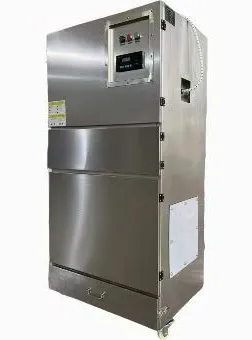Why Is an Industrial Dust Collector Essential for Workplace Safety and Efficiency?
2024-11-14
In many industrial environments, dust is more than just a nuisance—it can be a serious safety hazard. From harmful health effects on workers to equipment malfunctions and fire risks, dust can pose a range of dangers. This is where an industrial dust collector comes in. But why exactly is an industrial dust collector essential for maintaining a safe and efficient workplace?
In this blog, we’ll explore what industrial dust collectors are, why they’re important, and how they contribute to both safety and productivity in various industries. Whether you’re in manufacturing, woodworking, pharmaceuticals, or any other sector that generates dust, understanding the importance of a dust collection system is key to creating a cleaner, safer, and more efficient environment.
What is an Industrial Dust Collector?
An industrial dust collector is a system designed to remove dust and particulate matter from the air in manufacturing and industrial settings. These systems work by capturing dust particles at various stages of the production process—whether they’re generated during cutting, grinding, sanding, or any other manufacturing operation that creates airborne debris.
Industrial dust collectors generally consist of the following components:
- Dust collection hood: Captures dust as it is generated.
- Ductwork: Channels the dust-laden air to the collector.
- Dust collector unit: Filters and captures dust particles, often using bag filters, cartridge filters, or cyclonic action.
- Air cleaning system: Removes the captured dust and discharges clean air back into the workplace or exhausts it outside.
By removing dust from the air, these systems help improve air quality, comply with health and safety regulations, and ensure that equipment runs smoothly without being clogged by debris.
Why Are Industrial Dust Collectors Important?
1. Improved Workplace Safety
One of the primary reasons industrial dust collectors are essential is the safety they provide in the workplace. In many industrial settings, dust particles aren’t just unsightly—they can pose significant health risks. Breathing in dust from materials like wood, metal, plastics, or chemicals can lead to serious respiratory conditions, including asthma, chronic obstructive pulmonary disease (COPD), and even lung cancer in the long term.
In addition to health risks, dust also creates fire and explosion hazards. Certain materials, like wood dust or metal dust, are highly flammable. If these particles accumulate in large quantities, they can ignite and lead to dangerous explosions. Dust collectors reduce this risk by preventing dust buildup, maintaining a cleaner and safer environment for workers.
2. Enhanced Air Quality
Industrial workplaces can become quite polluted with airborne particulates if the dust is not properly controlled. Poor air quality can not only harm workers but can also affect overall productivity. When workers are exposed to a dusty environment, they may experience discomfort, respiratory issues, and fatigue, leading to reduced efficiency and potential sick days.
By filtering dust and particulates from the air, industrial dust collectors help maintain a healthier and more breathable environment. This not only benefits the workers' health but also boosts morale and reduces absenteeism, improving overall workplace efficiency.
3. Compliance with Health and Safety Regulations
Many countries have stringent regulations around air quality and worker safety, especially in industries like woodworking, mining, pharmaceuticals, and metalworking, where dust is a significant concern. Regulations such as the Occupational Safety and Health Administration (OSHA) standards in the U.S. or the European Union's industrial hygiene directives require businesses to control airborne dust levels.
An industrial dust collector ensures that companies remain compliant with these regulations by reducing dust emissions to acceptable levels. Not only does this help avoid costly fines and penalties, but it also demonstrates a commitment to worker welfare and environmental stewardship.
4. Prevention of Equipment Damage
In industrial environments, equipment such as motors, ventilators, and machines are often exposed to dust particles. Over time, dust can accumulate inside machinery and cause it to overheat, malfunction, or wear out prematurely. This leads to increased maintenance costs, downtime, and potentially costly repairs.
Dust collectors help mitigate this risk by removing dust before it can accumulate on sensitive equipment. By keeping machinery clean, companies can reduce maintenance needs, extend the lifespan of equipment, and maintain operational efficiency.
5. Improved Productivity and Efficiency
When dust accumulates, it can obstruct airflow and interfere with the smooth operation of machinery. For example, dust buildup in vacuum systems, conveyors, or air filters can reduce system efficiency, increase energy consumption, and slow down production speeds. By preventing dust buildup, industrial dust collectors help ensure that machines run at optimal efficiency.
Moreover, workers can focus more on their tasks without being distracted or hampered by poor air quality or excessive cleaning. As a result, industrial dust collection systems contribute to higher productivity and a more streamlined workflow.
6. Cost Savings
Although investing in an industrial dust collector requires an initial outlay, it offers significant long-term savings. These systems help reduce the need for manual cleaning, which can be time-consuming and costly. Additionally, dust collectors help prevent damage to machinery, reduce the likelihood of workplace accidents, and reduce employee health-related absences. This all contributes to lower operational costs in the long run.
Moreover, dust collection systems are designed to be energy-efficient, meaning they can operate without consuming excessive amounts of power. This helps businesses reduce their energy bills while maintaining a clean and safe environment.
7. Sustainability and Environmental Protection
Industrial dust collectors contribute to sustainability by reducing the environmental impact of dust emissions. Dust that is not properly captured can escape into the atmosphere, contributing to pollution and environmental degradation. By using an industrial dust collection system, companies can ensure that harmful particulates are properly contained and disposed of, contributing to a cleaner environment both inside and outside the workplace.
Many dust collection systems are also designed to be recyclable, allowing collected dust to be safely disposed of or even repurposed, depending on the material.
Types of Industrial Dust Collectors
There are several types of industrial dust collectors, each suited to specific applications:
- Baghouse Dust Collectors: These systems use large fabric bags to capture dust particles. They are ideal for industries with fine dust and high-volume dust emissions.
- Cartridge Dust Collectors: These use high-efficiency filters to capture smaller dust particles. They are typically used in environments where a smaller footprint and higher filtration efficiency are needed.
- Cyclone Dust Collectors: Cyclonic action is used to separate large dust particles from the air. These are often used as pre-filters or in applications with coarse particles.
- Wet Dust Collectors: These systems use water or other liquids to capture dust. They are often used for metalworking or chemical processing where dust is particularly hazardous.
Conclusion
An industrial dust collector is more than just a piece of equipment—it is a critical component in maintaining a safe, healthy, and efficient workplace. From protecting worker health and preventing fires to improving machinery performance and reducing costs, the benefits of dust collectors are clear.
For any industry where dust is a concern, investing in a high-quality dust collection system is a smart decision. It not only ensures compliance with safety regulations but also promotes a culture of safety, efficiency, and environmental responsibility.
So, if your workplace generates dust, it's time to ask: Why not invest in an industrial dust collector to enhance safety, productivity, and long-term savings?



